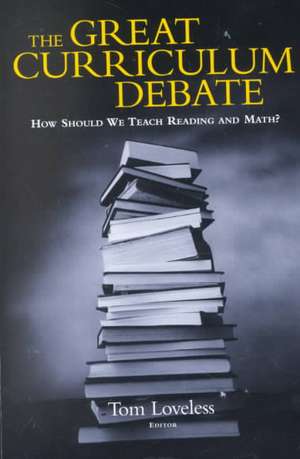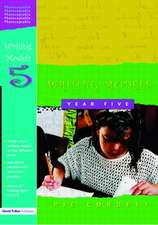The Great Curriculum Debate: How Should We Teach Reading and Math?
Editat de Tom Lovelessen Limba Engleză Paperback – noi 2001
Since the early twentieth century, American educators have been engaged in a heated debate over what schools should teach and how they should teach it. The partisans—"education progressives" and "education traditionalists"—have usually kept their disagreements within the walls of the nation's schools of education. Periodically, however, arguments have erupted which have generated headlines and attracted public attention, making clear the potential for bitterness and rancor in education politics. In the 1990s, progressives and traditionalists squared off in a dispute over reading and mathematics. Arguments over how best to teach these two subjects is detailed in The Great Curriculum Debate: How Should We Teach Reading and Math? This book includes contributions from distinguished scholars from both sides of the debate, as well as influential nonpartisans. The proponents of "whole language" and "phonics" present their opposing views on reading. Advocates and opponents of "NCTM math reform"—the agenda of the National Council of Teachers of Mathematics (NCTM)—discuss their differing opinions about math. Although the authors disagree on many of the most important aspects of learning, they agree on one point: the school curriculum matters. Decisions made now about the content of reading and mathematics will have long term consequences, not only for students and schools, but for society as a whole. Contributors include E. D. Hirsch Jr. (University of Virginia), Gail Burrill (Mathematical Sciences Education Board), Michael T. Battista (Kent State University), David C. Geary (University of Missouri, Columbia), Roger Shouse (Penn State University), Adam Gamoran (University of Wisconsin, Madison), Richard Askey (University of Wisconsin, Madison), Diane Ravitch (New York University), Catherine E. Snow (Harvard University), Margaret Moustafa (California State University, LA), Richard L. Allington (University of Florida), William Lowe Boyd (Penn State University), and Douglas E. Mitchell (University of California, Riverside).
Preț: 220.40 lei
Nou
Puncte Express: 331
Preț estimativ în valută:
42.18€ • 45.80$ • 35.43£
42.18€ • 45.80$ • 35.43£
Carte tipărită la comandă
Livrare economică 22 aprilie-06 mai
Preluare comenzi: 021 569.72.76
Specificații
ISBN-13: 9780815753094
ISBN-10: 0815753098
Pagini: 328
Dimensiuni: 152 x 229 x 24 mm
Greutate: 0.5 kg
Ediția:New.
Editura: Brookings Institution Press
Colecția Brookings Institution Press
ISBN-10: 0815753098
Pagini: 328
Dimensiuni: 152 x 229 x 24 mm
Greutate: 0.5 kg
Ediția:New.
Editura: Brookings Institution Press
Colecția Brookings Institution Press
Notă biografică
Tom Loveless is director of the Brown Center on Education Policy and senior fellow in the Governance Studies program at the Brookings Institution. He is the author of the annual Brown Center Reports on American Education.
Descriere
Since the early twentieth century, American educators have been engaged in a heated debate over what schools should teach and how they should teach it. The partisans—"education progressives" and "education traditionalists"—have usually kept their disagreements within the walls of the nation's schools of education. Periodically, however, arguments have erupted which have generated headlines and attracted public attention, making clear the potential for bitterness and rancor in education politics. In the 1990s, progressives and traditionalists squared off in a dispute over reading and mathematics. Arguments over how best to teach these two subjects is detailed in The Great Curriculum Debate: How Should We Teach Reading and Math? This book includes contributions from distinguished scholars from both sides of the debate, as well as influential nonpartisans. The proponents of "whole language" and "phonics" present their opposing views on reading. Advocates and opponents of "NCTM math reform"—the agenda of the National Council of Teachers of Mathematics (NCTM)—discuss their differing opinions about math. Although the authors disagree on many of the most important aspects of learning, they agree on one point: the school curriculum matters. Decisions made now about the content of reading and mathematics will have long term consequences, not only for students and schools, but for society as a whole. Contributors include E. D. Hirsch Jr. (University of Virginia), Gail Burrill (Mathematical Sciences Education Board), Michael T. Battista (Kent State University), David C. Geary (University of Missouri, Columbia), Roger Shouse (Penn State University), Adam Gamoran (University of Wisconsin, Madison), Richard Askey (University of Wisconsin, Madison), Diane Ravitch (New York University), Catherine E. Snow (Harvard University), Margaret Moustafa (California State University, LA), Richard L. Allington (University of Florida), William Lowe Boyd (Penn State University), a



